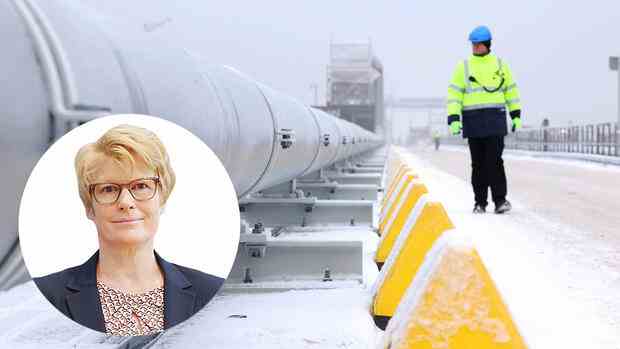Veronika Grimm is Professor of Economics at FAU Erlangen-Nuremberg and a member of the Advisory Council for the Assessment of Macroeconomic Development.
(Photo: Bloomberg, Imago [M])
Since the end of the Cold War, it has seemed inconceivable to many that war and violence could become reality again in the heart of Europe. But then the Russian attack on Ukraine shook Germany awake. The federal government reduced its energy dependency on Russia in record time and created a loan-financed special fund to modernize the Bundeswehr. But that can only be the beginning. In order to strengthen Europe’s ability to act in an increasingly insecure world, we are faced with the task of more closely interlinking our energy, climate, security and trade policies.
Critical dependencies that have arisen in the course of globalization due to the priority given to cost efficiency in value chains must be eliminated quickly, but this should not go hand in hand with extensive decoupling from “unfriendly” states. Because the increasing importance of global public goods such as climate protection and health makes it necessary not to weaken international cooperation, but to strengthen it. A challenging balancing act.
Studies show that the majority of goods imported into Europe come from China with little or no possibility of substitution. These are often products from the technology and healthcare sectors. As part of the “Important Projects of Common European Interest”, the EU is already trying to build up its own capacities in order to break free from dependencies, for example through the European cloud infrastructure, battery cell production and hydrogen technology.
Guarantees for foreign investments
There are further dependencies for critical raw materials, which are indispensable for numerous key technologies and for the energy transition. China, which has large amounts of such raw materials at its disposal, has achieved a dominant position on the world market – above all through the integration of value chains and its subsidy policy, which has caused prices on the world market to drop so much that mining deposits at other locations has become uneconomical.
Top jobs of the day
Find the best jobs now and
be notified by email.
If third countries abuse subsidies in order to create dependencies, Germany and the EU should use state instruments. Strategic alliances with democratic countries can help build new supply chains and reduce old dependencies. In order to diversify the supply chains, one should also rely on guarantees for foreign investments by German companies, for example.
It is particularly important to avoid new dependencies in the transformation to climate neutrality. If you let the price alone decide, in 20 years we will be dependent again – only on other autocracies, for example on the Arabian Peninsula. There, the providers of fossil fuels are preparing for the export of green hydrogen. Infrastructure for this already exists.
control in the event of a conflict
Experience shows how difficult it is to break free from dependencies. That’s why we have to seize the opportunity as soon as possible to do business with countries like Australia, Namibia, Canada and Chile, which also have good prerequisites for the production of green hydrogen. The initiative must come from Europe. The development of new energy trading relationships also gives us the opportunity to become more independent when purchasing additional raw materials. Last but not least, Europe must also build up more of its own capacities in many areas.
Our energy supply can become less dependent on imports through the ambitious development of network infrastructure and generation capacities. Even with critical raw materials, it should be carefully considered to what extent own extraction and further processing is possible. In doing so, problems of acceptance would have to be overcome and environmental pollution would have to be accepted. At the same time, however, even greater environmental damage in exporting countries would be avoided and technological development advanced.
Security policy aspects must always be taken into account immediately when establishing trade relations and one’s own infrastructure.
Chinese companies, for example, should only be able to invest in infrastructure in Europe if, in the event of a conflict, we can not only theoretically but actually ensure control. We therefore need a security strategy including responsive instruments. In the USA, for example, the Office of Foreign Assets Control is able to quickly and effectively counter threats to security interests with sanctions.
However, speed and effectiveness are hardly compatible with German perfectionism and the widespread risk aversion. In the more power-oriented world order, we need a new mindset. This cannot be achieved by politics only reacting to the mood of the population. The will to shape things and the leadership of the political actors must lead to a reorientation.
The author: Veronika Grimm is Professor of Economics at the FAU Erlangen-Nuremberg and a member of the Advisory Council for the Assessment of Overall Economic Development.
More: Japan shows how a country can become resource sovereign
